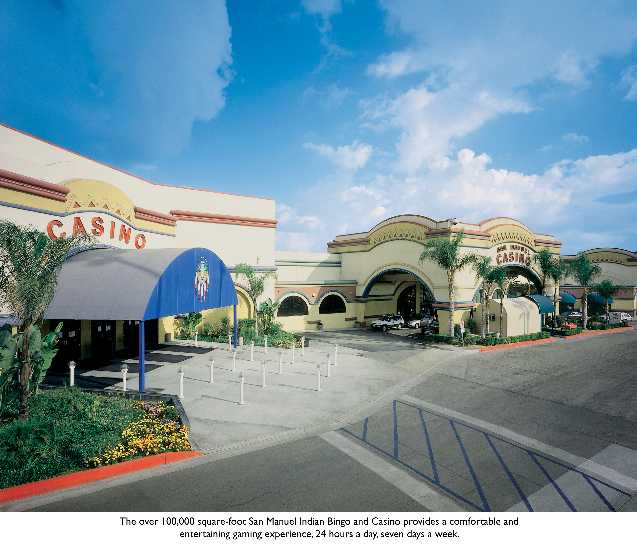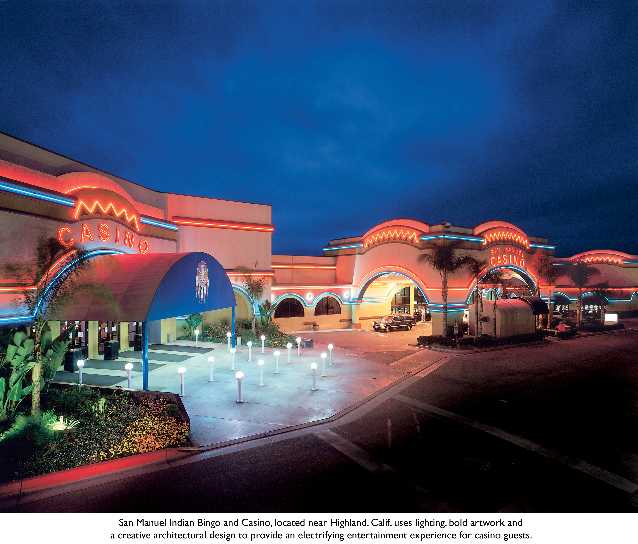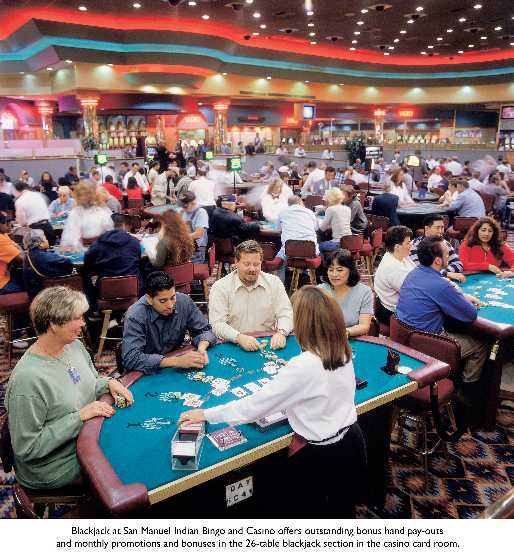 Another Stereotype of the Month entry:
Another Stereotype of the Month entry:
 Another Stereotype of the Month entry:
Another Stereotype of the Month entry:
Tribes Load Costs on Inland Cities
09:18 PM PST on Saturday, April 2, 2005
By NEIL DERRY
The city of San Bernardino has had to deal with the impacts of Indian gaming on reservation land for more than 15 years. The newly constructed, 480,000-square-foot San Manuel Indian Bingo and Casino, disastrously nestled in a long-developed residential community of homes, schools and churches, will only multiply the impacts — primarily traffic, vagrancy and property crimes — the previous gambling facility imposed.
There would at least be some solace if the community and city derived some benefit from this new facility. Unfortunately, other than a miniscule mitigation fund negotiated by former Gov. Pete Wilson, no benefit exists.
The impacts of the San Manuel casino have never been properly documented nor mitigated. Thanks to former Gov. Gray Davis, San Manuel and other gambling tribes were exempted from state environmental laws. That was one of the governor's final IOUs he owed the tribes, thanks to the Indians' significant campaign contributions.
Instead of a full Environmental Impact Report (EIR) that would be required of any business project of such scope, San Manuel was required only to present a brief environmental assessment to the public based on an environmental ordinance crafted by the tribe. Problem is, neither the ordinance nor the assessment can be challenged in state court. Can anyone imagine a Wal-Mart getting away with so little scrutiny?
This type of favoritism is indicative of the federal government's own unwillingness to enforce the Indian Gaming Regulation Act of 1988. That law clearly states that Indian gambling is allowed only on lands that were part of recognized reservations at the time the law was passed — with one exception: The Department of the Interior can grant landless tribes exemptions from the law by placing property in "trust."
This loophole has enabled the "reservation shopping" that allows the Lytton Band and a handful of other tribes to seek urban casinos in the East Bay Area, dozens of miles from their former reservations. Locally, the High Desert city of Hesperia is the target for a casino bid by the Timbisha Shoshone tribe; ironically, the San Manuel is fighting this project, claiming that the potential Hesperia gambling tract is on San Manuel ancestral land.
It also allowed the San Manuel tribe's new casino to be built on property that was not part of the reservation until 2001. This clearly violates the intent of the 1988 law, yet the Bureau of Indian Affairs refused to block the expanded casino.
The new San Manuel Indian Bingo and Casino will attract as many as 34,000 more cars through residential neighborhoods every day. This will exponentially increase the off-reservation impacts of the casino on the community. Vagrancy, prostitution, robberies, vehicle thefts and loitering have all increased dramatically in an area that suffered few of these problems before.
Parents of Belvedere Elementary School and Serrano Junior High School students say their children have been solicited for prostitution. Traffic has increased dramatically. Drug paraphernalia is commonly discarded in residential neighborhoods.
And because of the inadequate compacts signed by previous governors, the city has little recourse.
In August 2004, the California Performance Review commissioned by Gov. Schwarzenegger recommended that tribes be required by the state to enter into enforceable, comprehensive agreements with local governments to address the impacts of tribal gaming facilities on surrounding communities.
The panel recognized that the existing state compacts failed to mitigate the negative impacts on surrounding communities, nor did they require sufficient contributions by the tribes to offset local impacts.
For example, eight counties in California affected by casinos identified a combined need of $200 million to address impacts, but reported that they only received a total of $21.4 million in mitigation monies from the state mitigation fund, representing a total shortfall of $166 million.
What should be done to right this issue? First, the federal government must enforce its own laws. The Interior Department shouldn't allow reservation shopping; it should require tribes that hope to operate casinos to do so on traditional lands.
Second, state and local tribal compacts that regulate Indian gambling in California should require full environmental impact reports and mitigation for any impacts, and these must be fully enforceable by the courts.
Third, and most important, the racial monopoly that exists for legalized gambling in California must be eliminated. Gambling facilities should be allowed only in those local jurisdictions that want to be host to them.
The gambling genie is already out of the bottle in California, from our own state lottery to card clubs and tribal casinos. It is time to recognize that competition and proper regulation by local and state governments is the only possible way to curb the abuses that now exist if gambling is to provide any benefit to California as a whole.

Rob's reply
Another gaming critic wrongly plays the race card....
>> The newly constructed, 480,000-square-foot San Manuel Indian Bingo and Casino, disastrously nestled in a long-developed residential community <<
A long-developed community sitting on land originally owned by the San Manuel Band, that is.
>> Unfortunately, other than a miniscule mitigation fund negotiated by former Gov. Pete Wilson, no benefit exists. <<
"No benefit exists" if you exclude the jobs, income, and growth the casino generates, that is.
>> Thanks to former Gov. Gray Davis, San Manuel and other gambling tribes were exempted from state environmental laws. <<
Thanks to Davis and the US Constitution, which makes recognized tribes immune from most state regulation, that is.
>> Can anyone imagine a Wal-Mart getting away with so little scrutiny? <<
Can anyone imagine a Wal-Mart trying to rebuild itself after 500 years of disease, warfare, and oppression?
>> This type of favoritism is indicative of the federal government's own unwillingness to enforce the Indian Gaming Regulation Act of 1988. <<
Not really. It's more indicative of 200 years of court cases granting tribes a version of sovereignty. If the tribe had tried to open a bottled water plant before the passage of IGRA, it still would've been exempt from state environmental regulation. Why? Because it was and is semi-sovereign under the law.
>> It also allowed the San Manuel tribe's new casino to be built on property that was not part of the reservation until 2001. <<
So IGRA has one legal exception, according to Derry. (It actually has more, but never mind.) And San Manuel took legal advantage of that exception. So?
>> This clearly violates the intent of the 1988 law, yet the Bureau of Indian Affairs refused to block the expanded casino. <<
That may be clear to Derry, but it's not clear to anyone else. When people talk about tribes unfairly taking advantage of IGRA, they're usually talking about the Schaghticokes, the Graton Rancheria, or the Lytton Band of Pomos. The San Manuel Band doesn't make the list.
Casinos cause loitering?
>> Vagrancy, prostitution, robberies, vehicle thefts and loitering have all increased dramatically in an area that suffered few of these problems before. <<
Vagrancy? Loitering? Are these really crimes? Police charge people with these "offenses" when they're trying to enforce a social policy, not the law.
>> Parents of Belvedere Elementary School and Serrano Junior High School students say their children have been solicited for prostitution. <<
So the elderly who frequent casinos are soliciting grade-school children for prostitution within sight of their homes and parents? Why do I find this hard to believe?
How much credence can you give the stories of parents who probably opposed the casino from the beginning? Not much, I'd say.
Show me the hard stats on arrests and convictions near the casino. I don't buy anecdotal evidence from people who have an obvious conflict of interest.
>> In August 2004, the California Performance Review commissioned by Gov. Schwarzenegger recommended that tribes be required by the state to enter into enforceable, comprehensive agreements with local governments to address the impacts of tribal gaming facilities on surrounding communities. <<
The review commissioned by a governor who declared the tribes a "special interest" and demanded they pay a "fair share." With that in mind, can you say "built-in bias"? How about "preordained conclusion"?
>> For example, eight counties in California affected by casinos identified a combined need of $200 million to address impacts, but reported that they only received a total of $21.4 million in mitigation monies from the state mitigation fund, representing a total shortfall of $166 million. <<
Shouldn't that be a shortfall of $178.6 million?
>> What should be done to right this issue? First, the federal government must enforce its own laws. <<
The federal government is enforcing its own laws. Taking land into trust after the passage of IGRA is perfectly legal. If you don't like it, change the law. Don't pretend that a legal law is illegal because you don't like the outcome.

>> Second, state and local tribal compacts that regulate Indian gambling in California should require full environmental impact reports and mitigation for any impacts, and these must be fully enforceable by the courts. <<
Compacts are the result of negotiations between two supposedly equal sovereigns: a state and a tribe. If a state wants to negotiate a full environmental impact report, it can. If a tribe wants to agree with this, it can. If the tribe wants to get something in exchange for doing the report, it can try. It's all open to negotiation.
>> Third, and most important, the racial monopoly that exists for legalized gambling in California must be eliminated. Gambling facilities should be allowed only in those local jurisdictions that want to be host to them. <<
The so-called racial monopoly is neither racial nor a monopoly.
First, as the courts have ruled many times, the rights pertaining to Indian tribes are political, not racial. They're the same kind of rights a US citizen has but a Mexican citizen doesn't. Even if Mexicans were 100% Hispanic, excluding them from the rights of US citizenship wouldn't be racial discrimination. It would be a political decision based on borders, not a racial decision based on color.
Second, card clubs, racetracks, bingo halls, and the state lottery all conduct forms of gambling. The tribes may have a state monopoly on certain types of slot machines, but they don't on gambling overall. Besides, California's voters had a chance to overturn this "monopoly" when they voted on Prop. 67. They voted against the proposition, thus affirming the tribes' unique political status.
>> The gambling genie is already out of the bottle in California, from our own state lottery to card clubs and tribal casinos. <<
Whoops. Derry contradicts his own statement that tribes have a monopoly on gambling.
>> It is time to recognize that competition and proper regulation by local and state governments is the only possible way to curb the abuses that now exist if gambling is to provide any benefit to California as a whole. <<
By taking Indians off the welfare rolls, repairing and rebuilding reservations, and—not incidentally—becoming the fastest growing employer in California, Indian gaming is already benefiting the state as a whole.
Related links
Indian rights = special rights
The facts about Indian gaming
|
. . . |

|
All material © copyright its original owners, except where noted.
Original text and pictures © copyright 2007 by Robert Schmidt.
Copyrighted material is posted under the Fair Use provision of the Copyright Act,
which allows copying for nonprofit educational uses including criticism and commentary.
Comments sent to the publisher become the property of Blue Corn Comics
and may be used in other postings without permission.